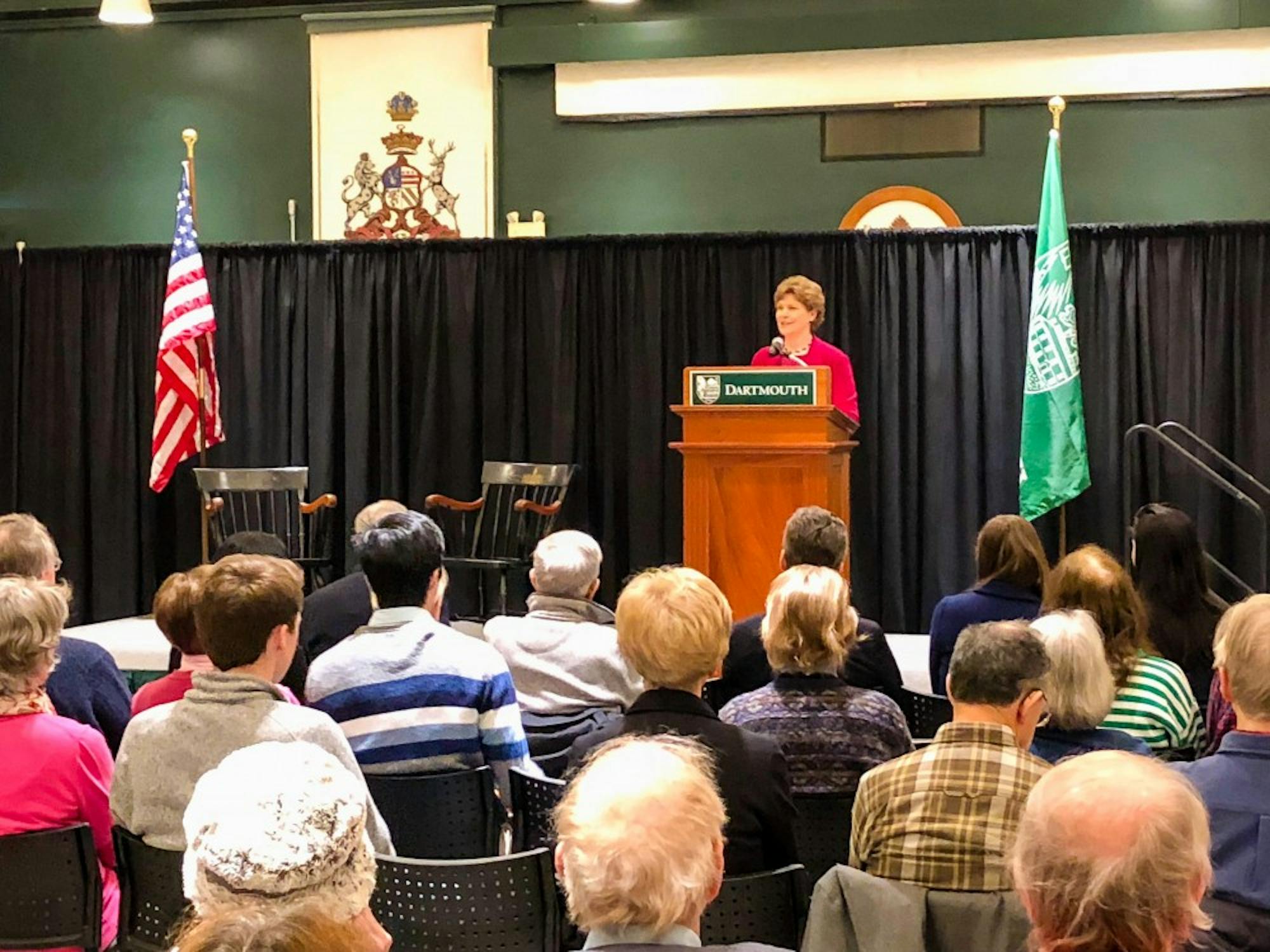Sen. Jeanne Shaheen (D-NH) criticized Russia’s interference in foreign affairs and urged the U.S. to respond strongly, both in domestic policies and in rhetoric, during a talk in Alumni Hall on Tuesday morning.
Shaheen sits on the Senate Committee on Armed Services and Committee on Foreign Relations and has been a leading voice in Congress to investigate Russia’s election meddling. Her talk, titled “Russian Interference in American Politics and Cyber Threats to Our Democracy,” had an attendance of around 165 people, according to Martha Austin, associate provost and executive officer and institutional contact for federal government relations.
Originally scheduled for Feb. 9 but canceled due to a late budget vote that kept Shaheen in the capital late the previous night, the talk on Tuesday began with introductory remarks by College President Phil Hanlon. Shaheen then spoke for about 15 minutes, followed by a question and answer session moderated by interim provost David Kotz ’86.
During her talk, Shaheen said she believes foreign interference in domestic issues through online influence and misinformation campaigns is one of the biggest threats facing the U.S. She argued that since “advanced technology has essentially rendered states borderless,” the U.S. must amend its security apparatus to address these new threats.
She called for the creation of a clear command structure to be in charge of cybersecurity at the Department of Defense and throughout the federal government.
In the talk, Shaheen mentioned two purposes of Russian cyber campaigns: “to inflame divisive social issues in the U.S. and to get followers hooked on Russian influence accounts as a way to spread other Kremlin-friendly messages.”
She said during the talk that Russian foreign intervention is motivated by Russian President Vladimir Putin’s interest in recreating in some form the Russian Empire, and in order to do that he has to undermine Western democracies.
She emphasized that Russia has tried to interfere not only in U.S. elections, but also in elections throughout Europe. Russia tried to sway public opinion leading up to events such as the United Kingdom’s Brexit vote, the French 2017 elections, domestic struggles in Ukraine and the ongoing Catalonian independence movement in Spain, she said.
Shaheen stressed that this Russian interference is occurring constantly, not only during periods leading up to elections. As an example, she referenced a recent article in The New York Times that reported that automated Russian Twitter bots sought to inflame divisions in the U.S. following the school shooting in Parkland, Florida.
She discussed the many ways that Russia has used online tools and services to influence public opinion in the U.S.
“Gone are the days of propaganda posters,” Shaheen said in her talk. “We’re in a new age where hostile actors can take root within our own borders and become something that even our government can’t easily detect.”
In place of propaganda posters, countries like Russia have been using various online methods to influence public opinion. According to Shaheen, these methods include misinformation campaigns through “fake news” websites, the use of social media “bots” that post en masse to inflate issues and divisions that would otherwise be relatively minor and hacking American organizations to gather data on American voters.
Shaheen has previously spoken on cybersecurity, specifically on the security problems posed by Kaspersky Lab, a Russian company that serves an estimated 400 million users worldwide. In her talk, Shaheen said that since Kaspersky Lab houses all of its servers in Moscow, it is required by Russian law to make available to Russian intelligence services all data that is shared between servers and computers that house Kaspersky Lab software. Late last year, Shaheen succeeded in passing legislation that banned Kaspersky software from use on all government computers.
One of the reasons Shaheen said she came to the College is that Dartmouth is home to some of the leading cybersecurity experts in the country. She referenced in particular the work of computer science professors Hany Farid and Venkatramanan Subrahmanian.
Dartmouth’s Institute of Security, Technology and Society, which researches cybersecurity issues, reached out to Shaheen following her Kaspersky legislation and expressed interest in bringing her to campus, according to an email statement from College spokesperson Diana Lawrence.
Shaheen also stressed the importance of educating people, especially young people, on issues of misinformation. She pointed to Italy as a model example. There, according to Shaheen, the school system is working to help young people identify fake news and other disinformation that they may encounter online.
At several points during the talk, Shaheen was critical of President Donald Trump’s hesitance to impose additional sanctions on Russia. She also criticized the “partisan attacks” of the Federal Bureau of Investigation and the Department of Justice since the attacks “would help the Kremlin achieve its goal of sowing discord among Americans and weakening our country.”
“I thought that the speech was very well informed and she gave a really impassioned and powerful critique of one of the most pressing issues facing our country today,” said Dartmouth College Democrats president Jennifer West ’20, who attended the talk.
In an interview after the event, Shaheen said she hopes her talk will spark a discussion on campus about the role of the U.S. in the world and the importance of the rule of law. She also hopes that students will be concerned about statements they hear that may be designed to undermine the FBI, the Department of Justice or DOJ special counsel Robert Mueller’s investigation into Russian interference in the 2016 presidential election. Additionally, Shaheen said she hopes her talk “will help people think about what they’re viewing on social media in a way that makes them question whether stories they’re reading are accurate or not.”




